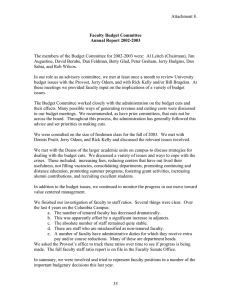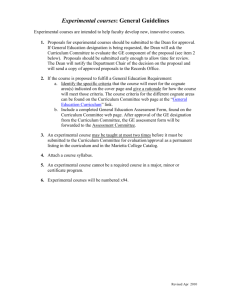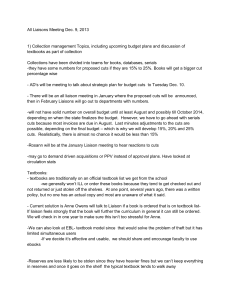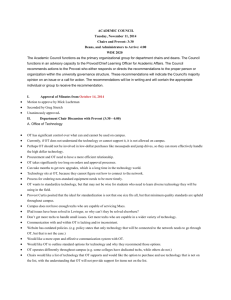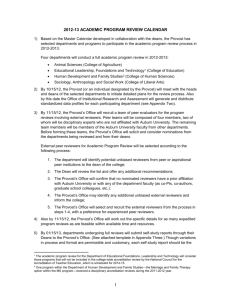test junk - College of Arts & Sciences
advertisement
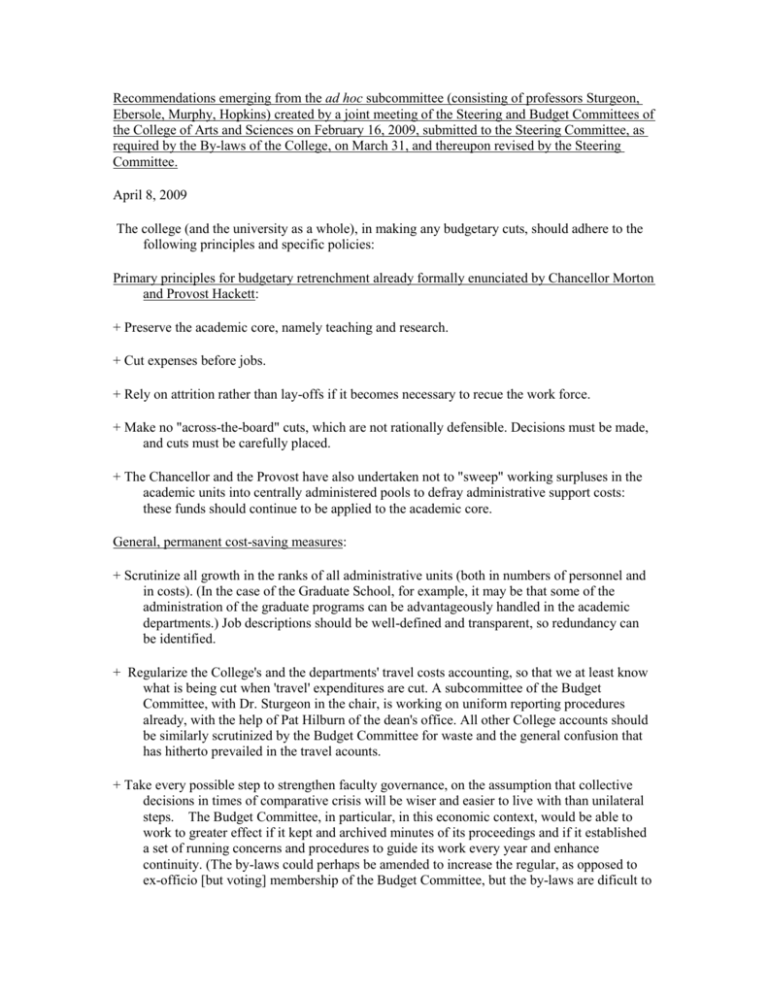
Recommendations emerging from the ad hoc subcommittee (consisting of professors Sturgeon, Ebersole, Murphy, Hopkins) created by a joint meeting of the Steering and Budget Committees of the College of Arts and Sciences on February 16, 2009, submitted to the Steering Committee, as required by the By-laws of the College, on March 31, and thereupon revised by the Steering Committee. April 8, 2009 The college (and the university as a whole), in making any budgetary cuts, should adhere to the following principles and specific policies: Primary principles for budgetary retrenchment already formally enunciated by Chancellor Morton and Provost Hackett: + Preserve the academic core, namely teaching and research. + Cut expenses before jobs. + Rely on attrition rather than lay-offs if it becomes necessary to recue the work force. + Make no "across-the-board" cuts, which are not rationally defensible. Decisions must be made, and cuts must be carefully placed. + The Chancellor and the Provost have also undertaken not to "sweep" working surpluses in the academic units into centrally administered pools to defray administrative support costs: these funds should continue to be applied to the academic core. General, permanent cost-saving measures: + Scrutinize all growth in the ranks of all administrative units (both in numbers of personnel and in costs). (In the case of the Graduate School, for example, it may be that some of the administration of the graduate programs can be advantageously handled in the academic departments.) Job descriptions should be well-defined and transparent, so redundancy can be identified. + Regularize the College's and the departments' travel costs accounting, so that we at least know what is being cut when 'travel' expenditures are cut. A subcommittee of the Budget Committee, with Dr. Sturgeon in the chair, is working on uniform reporting procedures already, with the help of Pat Hilburn of the dean's office. All other College accounts should be similarly scrutinized by the Budget Committee for waste and the general confusion that has hitherto prevailed in the travel acounts. + Take every possible step to strengthen faculty governance, on the assumption that collective decisions in times of comparative crisis will be wiser and easier to live with than unilateral steps. The Budget Committee, in particular, in this economic context, would be able to work to greater effect if it kept and archived minutes of its proceedings and if it established a set of running concerns and procedures to guide its work every year and enhance continuity. (The by-laws could perhaps be amended to increase the regular, as opposed to ex-officio [but voting] membership of the Budget Committee, but the by-laws are dificult to amend.) + Prohibit administrators' henceforth taking administrators' salaries with them back to their departments after leaving office (exempting current ofice-holders, at their current ranks). + The Dean of the College should negotiate with the Provost regarding the proper and timely return of Student Computing Fees to the College. + Eliminate all administrative charges (such as for telephone and internet service) that do not reflect real costs. If labor for support services must be obtained within the institution, ensure that the cost of the labor is competitive. (It can be expected that such matters will be referred to the Support Costs Committee established by the new budget model.). + If cuts must be absorbed in any fiscal year, consider delaying pay checks scheduled to be disbursed on June 30 by one day and if necessary delay checks scheduled for May 31 by a month. This measure could be taken on a voluntary basis, or it could be mandatory for highsalaried employees. + With new DARS advising system available, allow expenditures in the A&S Advising Office, a substantial portion of which goes for student workers, to fall, through attrition and reassignment. + Offer more incentives, within the College, to the most senior faculty and perhaps to other volunteers to move off the regular payroll and onto the pension plan (assuming that the plan could support the extra weight). Measures for growth + Step up permanent efforts to recruit and retain students. + Pursue decoupling UMKC's tuition rates from those of the rest of the university system, so as to increase enrollments. + Reexamine allocation of student fees with attention to how extracurricular expenditures may have increased tuition in recent years. + Establish a permanent annual professional development allowance for all faculty-members, at some moderate level (say, $1,000, which would be $175,000 for the whole College), from UMKC funds (including College and ORS funds formerly reserved for research travel), to encourage both the development of effective teaching methods and research and its dissemination, including, in both cases, conference travel. The money should be allocated to individual faculty accounts, and its disbursement should be accounted for annually by standard accounting procedures. Money not expended in one year should be carried over. Expenditure of grant money (from whatever source), start-up funds, and RIF funds should remain at the scholar's discretion and should have no affect on this annual travel allowance. Cost-cutting strategies to be employed immediately if necessary: + Disallow all other travel not identified above in the last itme under 'Measures for growth' for the time being. See to it that, if travel for academic purposes is curtailed, no expenses for extracurricular travel and entertainment are incurred. + Reduce revenue lost through full fee waivers by offering partial fee waivers, although this is likely to have an impact on recruitment. + Limit the part-time teaching payroll. Oblige departments to provide fiscal justification for their use of part-time instructors. In general, allowing for the specific needs of seminars and laboratory courses, sections can be cut and class sizes can be increased. + If large cuts must be absorbed (5 to 10 %), the College should consolidate the duties of the associate deans and reduce that office by one associate dean to save the salary beyond that of a professor. No job would be threatened.
